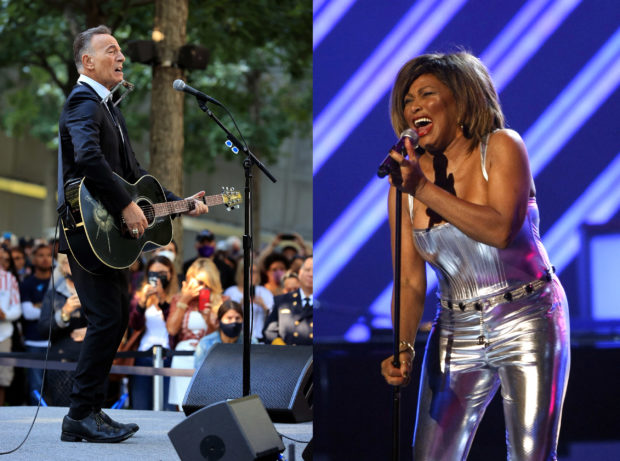How 2021 was the year when musicians sold their song catalogs

Bruce Springsteen performs during the annual 9/11 commemoration ceremony at the National 9/11 Memorial and Museum on Sept. 11, 2021 in New York. Image: AFP/Chip Somodevilla via ETX Daily Up
What do Bruce Springsteen, Tina Turner and Calvin Harris have in common?
They have all sold their song catalogs in recent months. These deals often involve huge sums of money, testifying to the appetite of companies like Hipgnosis Songs Fund for the repertoires of famous songwriters. So what’s going on?
Hipgnosis Songs Fund has quickly positioned itself in this market, which Goldman Sachs estimates will be worth $131 billion by 2030. This intellectual property investment and song management company created by Merck Mercuriadis — the former manager of Beyoncé, Elton John, Morrissey and Guns N’ Roses — holds the rights to 146 catalogs and 65,413 songs. Twenty of these feature in Billboard‘s Top 100 Songs of All Time, and 10 are on the list of most-viewed videos on YouTube.
These catalogs are valued at $2.55 billion, according to the British company. Their revenue increased 31% compared to 2020, reaching $74.1 million in the six months ending Sept. 30. Repertoires belonging to musicians with long careers behind them have been particularly successful this year, thanks to the enthusiasm that music lovers have for songs from previous decades.
‘The Boss’ sells song catalog for $550 million
Article continues after this advertisementIf Hipgnosis Songs Fund has succeeded in acquiring the rights to the coveted catalogs of the Red Hot Chili Peppers and Christine McVie of Fleetwood Mac, the repertoire of Springsteen has escaped its grasp. “The Boss” recently sold his music rights to Sony, the parent company of his Columbia Records label. The amount of this deal was reportedly close to $550 million, according to the New York Times and the American magazine Billboard. It surpasses the $300 million that Universal Music Group paid to acquire Bob Dylan’s complete publishing catalog in December 2020.
Article continues after this advertisementSpringsteen is the latest music star to sell off his repertoire, following in the footsteps of Turner, Paul Simon, Mötley Crüe and Shakira, whether for some or all of their works. And the financial markets are particularly interested in the acquisition of music rights, assets that generate stable revenue streams, since the rights holder receives royalties for each use of a song, whether in a film, television series, video game or advertisement.
An option that appeals to seasoned musicians
Music catalogs are benefiting from the rise of paid streaming through platforms like Spotify, Apple Music and others that make the discography of millions of artists available to their subscribers. And it’s clear that the songs and albums of the most experienced musicians are just as appealing, if not more so, than new releases. At the same time, the big hits of the last decades, such as Fleetwood Mac’s “Dreams” and “Man! I Feel Like A Woman” by Shania Twain are getting a new lease on life on social networks, especially on TikTok.
Once strongly discouraged, selling one’s song catalog is an option that has become increasingly attractive to aging songwriters since the beginning of the pandemic.
“They need to manage their finances, especially since they don’t know when they’ll be able to go back on the road to generate cash because of the pandemic. I propose to help them monetize their assets while involving them and respecting their artistic aspirations,” Mercuriadis told Les Echos in December 2020.
Selling the rights to a song catalog can also be tax-effective. As the New York Times points out, royalties are taxed like any other income, while the sale of a musical repertoire can be considered as a capital gain, generally taxed at a lower rate. All these arguments are pushing more and more artists to take the plunge. Indeed, Dolly Parton, David Crosby and Sting are reportedly in talks to sell their music rights catalogs.
Let the bidding begin. JB
RELATED STORIES:
Bruce Springsteen sells music catalog for $500 million